English [🇺🇸]
Have you ever stopped to think about the immensity of the oceans and, at the same time, how little we know about them? Approximately 70% of the Earth's surface is covered by oceans, but at the same time, because it is so vast, our knowledge of it is restricted to only 5% of its totality. And even though we are so small, our actions can influence both negatively and positively in its preservation, which depends on our choices.
Let's understand this? Let's get to some facts first.
Approximately 25 million tons of garbage per year end up in the sea, mostly plastic.
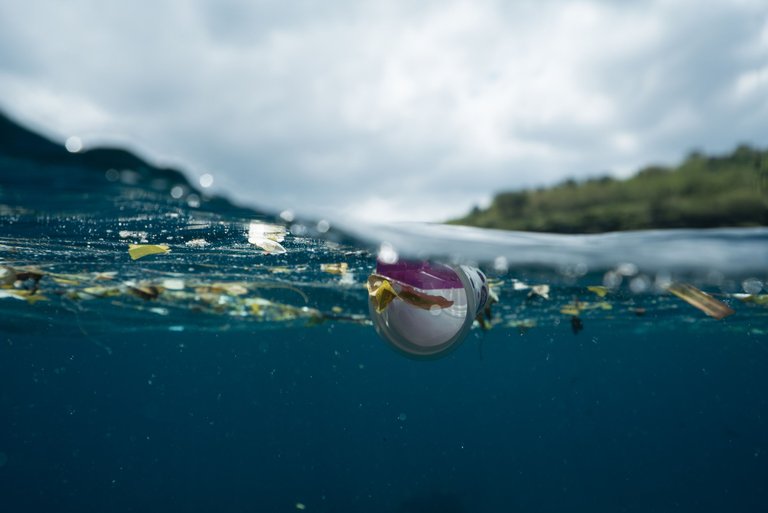
Photo by 7inchs: https://www.pexels.com/photo/rubbish-floating-in-blue-water-of-sea-6702766/
This survey was done by ISWA, the International Solid Waste Association, and the report indicated that at least 80% of this waste originates in large cities. This probably happens because of failures in waste management and the irresponsibility of companies and the population itself (yes, us).
All this garbage negatively affects (and a lot!) the environment and marine life.
It is estimated that around 100,000 marine animals die each year due to pollution of the seas and oceans.
According to a study by the University of Queensland, Australia, more than half of the entire population of sea turtles in the world have plastic waste in their organism.
We who use the sea to practice one of the most sensational sports in life have an obligation to take care of the oceans.
As if they were our home (it's a second home, right?). Surfing is about more than just fun. It's also about being environmentally responsible. Do you believe that?
I know that thinking about how to help the oceans can seem daunting and unattainable, but even small gestures and actions can make all the difference. Here in this post, we will talk about things that we can do in our daily routine and take it to life, with the certainty that we will be doing something good for the oceans and the planet. Let's go?
1 - Rethink your habits
Thinking, by itself, can be a tough task for many people, but believe me... it all starts here. And it's something you can do right now as you read this post. Rethinking our habits is extremely important, as it is essential to analyze what we consume and how we discard it. Rethinking requires you to ask yourself several questions:
- Do you dispose of your garbage correctly?
- Do you buy only what you need, or do you buy on impulse?*
Look around, look at your life, analyze, reflect, and rethink!
2 - Refuse single-use plastics
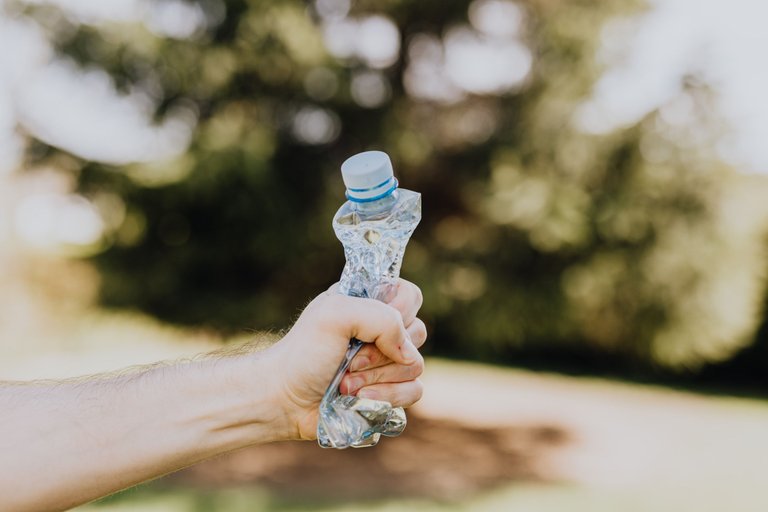
Photo by Karolina Grabowska: https://www.pexels.com/photo/crop-man-crushing-plastic-bottle-4498091/
We're all tired of hearing this, but let's try to resignify? According to the United Nations (UN), more than 40% of the plastic produced worldwide is used only once before being discarded. It is estimated that the useful life of a bottle of water, for example, is only 12 minutes, but it can take up to 400 years to decompose in the sea.
So what's the point of "throwing away" something meant to last hundreds of years? It doesn't, right? This is just an example. From the straw and the plastic cup to the packaging of bread, pasta, rice, or beans you buy at the supermarket, all of this can be given new meaning. As? When you refuse something, you usually have to look for an alternative. So keep reading. One thing leads to another!
3 - Buy at your local organic fair/farmer's market
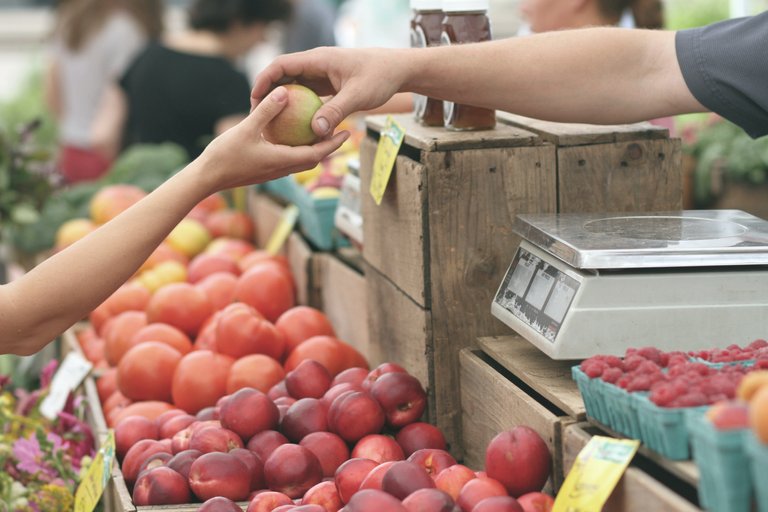
Photo by Erik Scheel: https://www.pexels.com/photo/person-giving-fruit-to-another-95425/
I bet you have a fair near your house or in your neighborhood. Did I get it right? If so, take the opportunity to take your cloth or returnable bag and literally do the fair! Most fruits and vegetables usually come with a natural packaging developed over thousands of years called a "peel". There's no need to pack something that's already naturally packed, right?
Then put it all mixed up in the same cloth bag! When we start to refuse things packaged in plastic (which usually contains preservatives that are harmful to our health), we automatically force ourselves to consume more natural products, such as fruits and vegetables. Your health and the oceans will thank you, as you will prevent a lot of plastic from ending up in the wrong place.
4 - Buy food in bulk
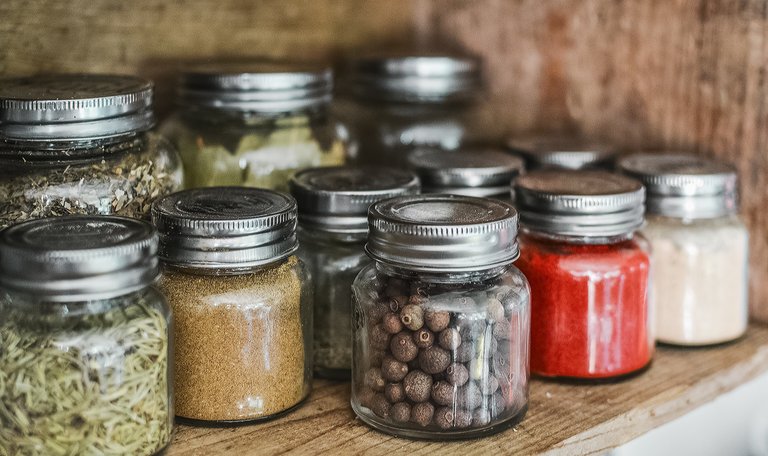
Photo by Pixabay: https://www.pexels.com/photo/aroma-aromatic-assortment-bottles-531446/
If you have access to any store that allows you to buy in bulk, take advantage. The tip here is to use your own containers. It could be that glass you bought tomato sauce, hearts of palm, olives... Or even a pot of ice cream or butter.
You just need to tell the person serving you that you will use your own packaging. This prevents millions and millions of unnecessary packages from ending up in the environment. Also, when you buy exactly the amount of food you need, you avoid leftovers in the fridge, spoiled food, and, consequently, food waste.
5 - Separate and dispose of your garbage correctly
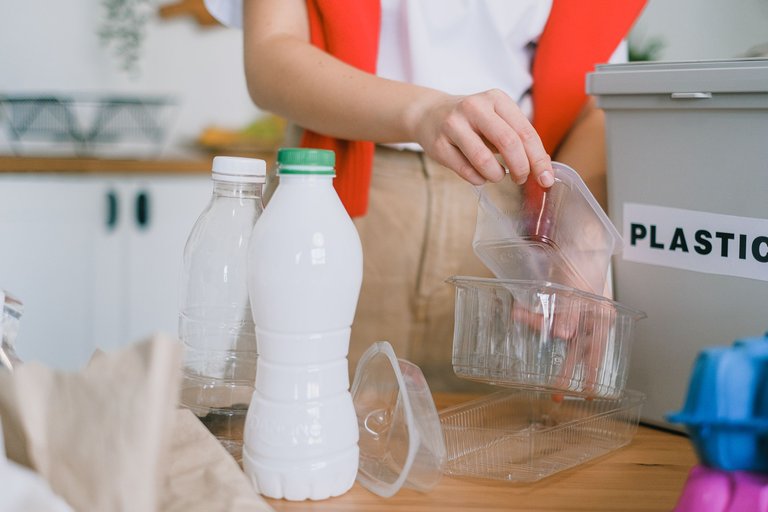
Photo by SHVETS production: https://www.pexels.com/photo/woman-sorting-out-plastic-wastes-at-home-7512867/
Most of the garbage we produce at home is probably in the kitchen, whether solid or organic. If you don't have access to a fair or establishments that sell in bulk, the least we can do is separate our garbage and dispose of it correctly.
What this means in practice: separate dry waste (paper, plastic, glass, and metal - remember to wash it before discarding) from organic waste (food scraps, such as fruits and vegetables, among others) and dispose of them correctly. Dry waste should go to recycling, and organic waste to composting (hello?).
6 - Compost!
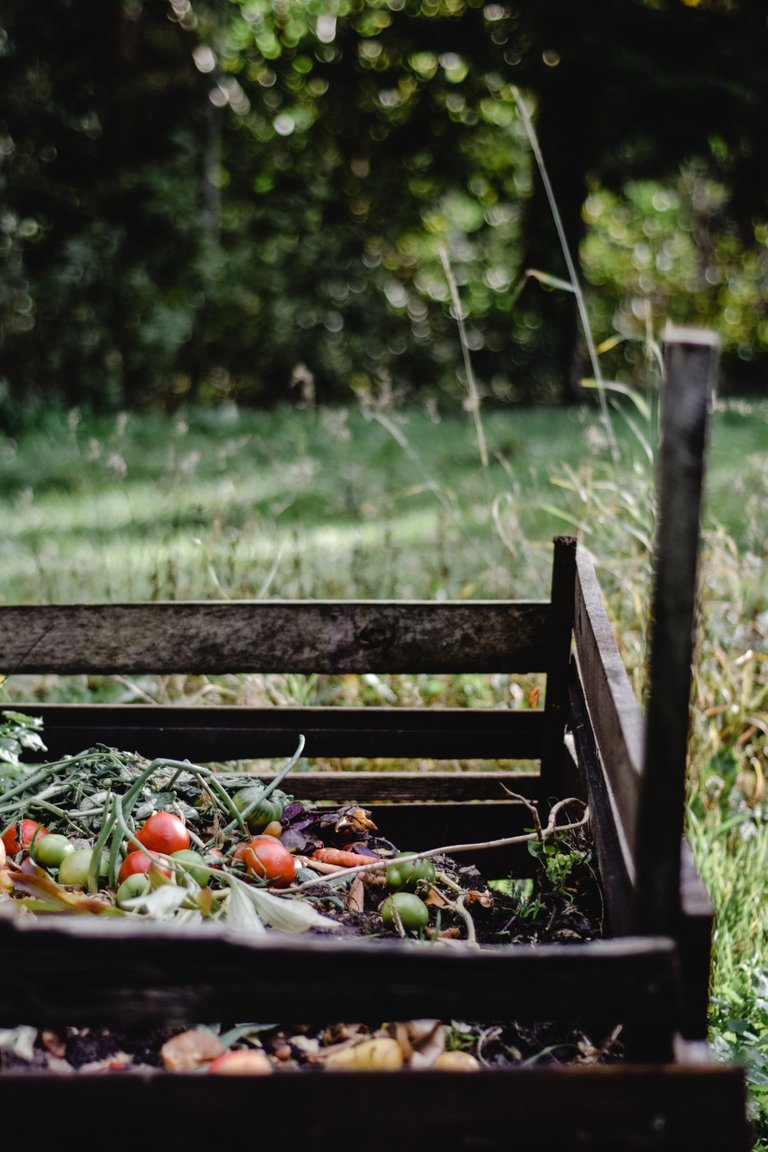
Photo by Eva Bronzini: https://www.pexels.com/photo/vegetables-on-the-soil-5503338/
Composting is a way to recycle our organic waste. It means turning our food scraps, in general, into fertilizer or land again. For this, you can have a composter inside your house or apartment, or if you have a backyard, you can separate a corner in it and use it as a composter without having to buy one.
Why is it important to separate dry and organic waste for composting? Because when they are mixed, they are neither recyclable nor compostable, being classified as trash/common waste. And this waste automatically goes to landfills. According to data from the Brazilian Association of Public Cleaning and Special Waste Companies (Abrelpe), 41% of all the garbage produced year after year in Brazil ends up where it shouldn't: in dumps and, consequently, in rivers and seas. So imagine how much can we prevent our garbage from ending up in the sea just by simply separating and disposing of our waste correctly?
7 - Consider giving up disposable pads
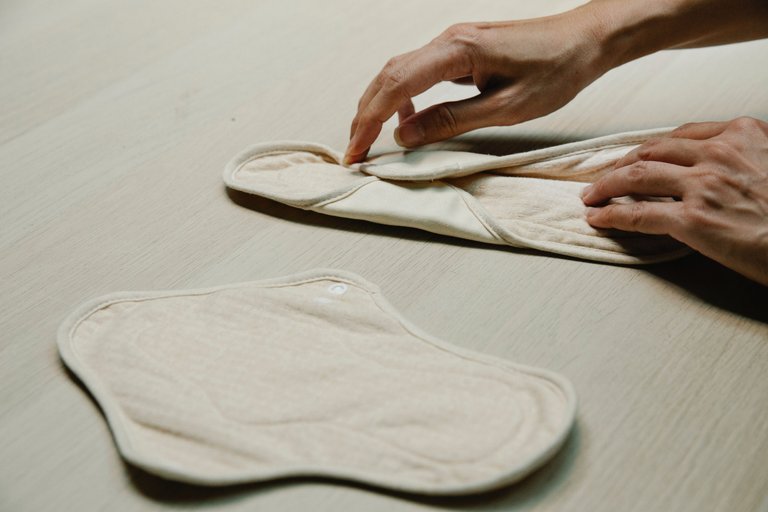
Photo by Sarah Chai: https://www.pexels.com/photo/a-person-folding-a-reusable-sanitary-pad-7262701/
Women are estimated to use about ten disposable pads in each menstrual cycle and an average of 10 to 15 thousand units from puberty to menopause. In Brazil, there is no recycling for this type of waste. Where do they end up? In landfills, rivers, beaches, and oceans.
Today's main alternatives are the menstrual cup, absorbent panties, and even cloth absorbers, all reusable and durable. And trust me, it may be an expensive investment at first, but in the long run, it's cheaper than using disposables (do your research and do the math yourself), and you'll avoid tons of this waste ending up in the oceans. And the friendly tip: you may not feel comfortable using any of these products, and it's ok. But it's important that you try and give it a chance. It's better to try than to do nothing.
8 - Watch your fish and seafood consumption
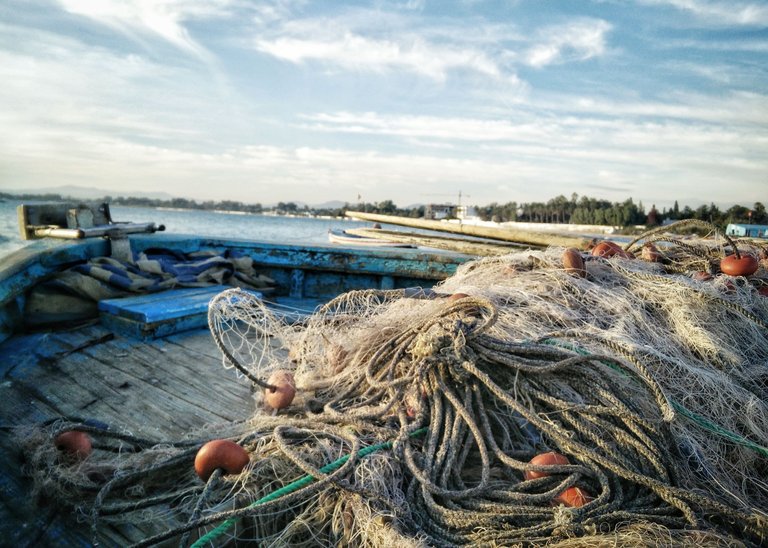
Photo by Bedis ElAcheche: https://www.pexels.com/photo/fish-net-on-gray-surface-891118/
Nets, lines, and fishing frames lost or discarded at sea are today one of the greatest threats to marine life. This is popularly known as ghost fishing. Each year, the volume of fishing material released into the oceans reaches 640,000 tons, according to the NGO World Animal Protection, leading to the death of thousands of animals daily. Much of this material comes from the fishing efforts of large companies and multinationals worldwide.
In this case, if you consume fish and/or seafood, it is best to buy from local fishermen who practice artisanal and sustainable fishing. With this, you contribute to the strengthening of the local economy, avoid overfishing, and at the same time, you will be contributing to the reduction of ghost fishing.
9 - Rethink the way you wash your clothes
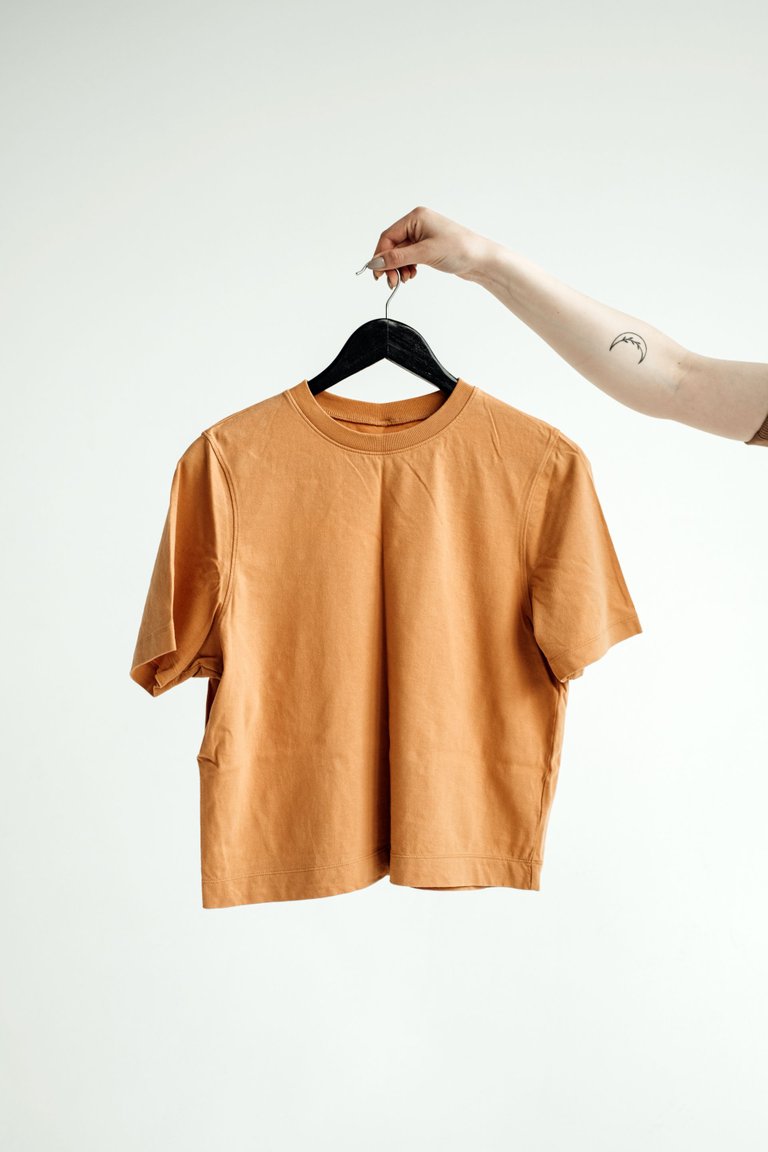
Photo by Vie Studio: https://www.pexels.com/photo/a-person-holding-a-clothes-hanger-with-orange-shirt-8148577/
Most microplastic pollution comes from fabrics, tires, and urban dust, which account for over 80% of all environmental microplastic pollution. You probably have clothes made from synthetic materials, such as polyester, polyamide, nylon, and elastane, right? When we wash our clothes, the friction between them, and even the temperature of the water, influence the detachment of fibers made of microplastics present in the clothes, which end up in the oceans and can be ingested by the fish.
To minimize this, you can always use cold or room temperature water and choose a washing cycle for your machine that is more "gentle" in the washing process. And if you can, prefer buying clothes made only of cotton.
10. Support organizations that work for the oceans
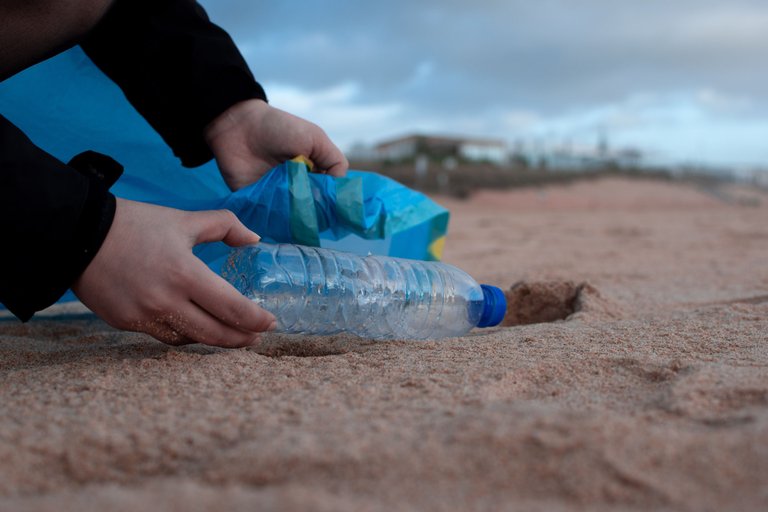
Photo by Marta Ortigosa: https://www.pexels.com/photo/person-holding-clear-plastic-bottle-3480494/
This is the easiest action you can take right now. Several organizations in Brazil (and the world) work to protect the oceans, whether doing research and studies or carrying out actions involving the entire community, such as beach cleanups.
If you live near the coast, try to integrate and get involved in these organizations' projects by volunteering your time. If you don't live on the beach, signing petitions and donating to foundations supporting marine ecosystem protection is another great way to get involved. And if you can't help financially, share and publicize the work these organizations do and contribute by changing habits at home, which already helps indirectly.
Wow!
Look, these are just a few simple tips. But helping the oceans can (and, in the ideal world, should) go much further than what is written in this post. We must understand that changing habits is necessary but must be our choice.
So if you are choosing now to do what you can to help the oceans, take this one: study, inform yourself, be active, educate, and be an example. And education is the answer to almost everything in this life.
There is so much information available on the internet and for free! Use and abuse technology to learn more about the problems our oceans face and how you can help them. The more you know, the more you understand, connect and create awareness about it. From there, do your best to spread the message, reach out to your friends and family, use social media to be active, and pass the message along. By sharing knowledge, you educate and inspire others.
And finally, I want to offer you my time and knowledge about all this (and more) I have already learned. I spent a few years of my life trying to adapt to new habits and break habits that were not good for the oceans. It was hard sometimes, and I kept learning (always! lol).
So if you're in doubt about something, want to change a habit but need to know how, or need help figuring out where to start, let's talk! I will be delighted to share what I know and try to help you as best as I can.
Mahalo!
About me
Biologist, Photographer, Content Producer, and Community Builder. Please take a look at my introduction post to get to know me better.
My social networks:
- Personal Instagram – me, my husband, my cats, sustainability, biology curiosities, and adventures: @crisciacm
- Professional Instagram – surf, nature, and people photos: @crisciacesconettophoto
- Youtube Channel - surf videos: @crisciacesconetto
- My profile at Thatsgnar.ly - crisciacesconetto
- Twitter – Não sei o que fazer por lá, mas existe: @crisciacm
Português - BR [🇧🇷]
Já parou pra pensar na imensidão dos oceanos e, ao mesmo tempo, o quão pouco a gente sabe sobre ele? Aproximadamente 70% da superfície do planeta Terra é coberta pelos oceanos, mas ao mesmo tempo, por ser tão vasto, nosso conhecimento sobre ele se restringe a apenas 5% da sua totalidade. E mesmo nós sendo tão pequenos, nossas ações podem influenciar tanto negativamente ou positivamente na sua preservação, e isso só depende das nossas escolhas.
Bora entender isso? Vamos a alguns fatos primeiro.
Ao ano, aproximadamente 25 milhões de toneladas de lixo acabam no mar, em sua maioria, plástico.

Foto de 7inchs: https://www.pexels.com/photo/rubbish-floating-in-blue-water-of-sea-6702766/
Este levantamento foi feito pela ISWA, a Associação Internacional de Resíduos Sólidos, e o relatório indicou que pelo menos 80% desse lixo tem origem nas grandes cidades. Isso acontece provavelmente por causa de falhas na gestão de resíduos e também por causa da irresponsabilidade das empresas e da própria população (sim, nós).
Todo esse lixo afeta negativamente (e muito!) o ambiente e a vida marinha.
Estima-se que cerca de 100 mil animais marinhos morram por ano devido à poluição dos mares e oceanos.
Segundo estudo realizado pela Universidade de Queensland, na Austrália, e que mais da metade de toda a população de tartarugas marinhas do mundo têm lixo plástico no organismo.
Nós que utilizamos o mar para praticar um dos esportes mais sensacionais da vida, temos a obrigação de cuidar nos oceanos.
Como se eles fossem nossa casa (bem ou mal, é uma segunda casa, né?). Surfar não é só sobre diversão, mas também sobre ter responsabilidade ambiental. Você acredita nisso?
Eu sei que pensar sobre como ajudar os oceanos pode parecer uma tarefa difícil e inalcançável, mas mesmo os pequenos gestos e ações podem fazer toda a diferença. Aqui nesse post vamos falar sobre coisas que podemos fazer no nosso dia-a-dia, na nossa rotina e levar pra vida, com a certeza que estaremos fazendo algo bom, não só para os oceanos, mas para o planeta. Bora?
1 - Repense seus hábitos
Pensar, por si só, pode ser uma tarefa muito difícil pra muitas pessoas, mas acredite em mim... tudo começa aqui. E é uma coisa que você pode fazer agora, enquanto lê esse post. Repensar cada um de nossos hábitos é extremamente importante, pois é indispensável analisar o que consumimos e como descartamos. Repensar exige que você se faça várias perguntas:
- você descarta seu lixo da forma correta?
- você compra só o que precisa ou compra por impulso?*
Olhe a sua volta, olha pra sua vida, analise, reflita e repense!
2 - Recuse plásticos de uso único

Foto de Karolina Grabowska: https://www.pexels.com/photo/crop-man-crushing-plastic-bottle-4498091/
Acho que todos estamos cansados de ouvir isso, mas bora tentar ressignificar? De acordo com a Organização das Nações Unidas (ONU), mais de 40% do plástico produzido em todo o mundo é usado apenas uma vez antes de ser descartado. Estima-se que a vida útil de uma garrafinha de água, por exemplo, é de apenas 12 minutos, mas ela pode levar até 400 anos para se decompor no mar.
Então que sentido faz "jogar fora" uma coisa que foi feita pra durar centenas de anos? Não faz, né? Isso é apenas um exemplo. Desde o canudo e o copinho plástico até a embalagem de pão, macarrão, arroz ou feijão que você compra no supermercado, tudo isso pode ser ressignificado. Como? Quando você recusa uma coisa, normalmente você tem que buscar uma alternativa praquilo. Então continua lendo, que uma coisa leva a outra!
3 - Compre na feira

Foto de Erik Scheel: https://www.pexels.com/photo/person-giving-fruit-to-another-95425/
Aposto que tem uma feira perto da sua casa ou no seu bairro. Acertei? Se sim, aproveite pra levar a sua sacola de pano ou retornável e literalmente, faça a feira! A maioria das frutas e verduras geralmente já vem com uma embalagem natural desenvolvida durante milhares de anos e ela se chama "casca". Não há necessidade de embalar algo que já está naturalmente embalado, né?
Então põe tudo misturado dentro do saco de pano mesmo! Quando começamos a recusar coisas embaladas em plásticos (que geralmente possuem conservantes que fazem mal a nossa saúde), passamos automaticamente a nos obrigar a consumir mais produtos naturais, como frutas e verduras. Sua saúde - e a dos oceanos - agradece, pois você estará impedindo que muito plástico vá parar no lugar errado.
4 - Compre alimentos a granel

Foto de Pixabay: https://www.pexels.com/photo/aroma-aromatic-assortment-bottles-531446/
Se você tem acesso a qualquer loja que te permita comprar a granel, aproveite. A dica aqui é utilizar seus próprios recipientes. Pode ser aquele vidro que você comprou molho de tomate, palmito, azeitona... Ou até mesmo o pote de sorvete ou margarina.
Você só precisa comunicar a quem vai te atender, que você vai usar sua própria embalagem. Isso evita que milhões e milhões de embalagens desnecessárias acabem no meio ambiente. Além disso, quando você compra exatamente a quantidade de alimento que você precisa, você evita sobras na geladeira, comida estragada e, consequentemente, o desperdício de comida.
5 - Separe e descarte seu lixo corretamente

Foto de SHVETS production: https://www.pexels.com/photo/woman-sorting-out-plastic-wastes-at-home-7512867/
Provavelmente, a maior parte do lixo que produzimos em casa está na cozinha, sejam eles sólidos ou orgânicos. Se de tudo você não tiver acesso a uma feira ou a estabelecimentos que vendam a granel, o mínimo que podemos fazer é separar nosso lixo e descartá-lo corretamente.
O que isso quer dizer na prática: separe o lixo seco (papel, plástico, vidro e metal - não esqueça de lavar antes de descartar) do orgânico (restos de alimentos, como frutas e verduras, entre outros) e destine-os corretamente. O lixo seco deve ir para a reciclagem e o lixo orgânico para a compostagem (oi?).
6 - Faça compostagem

Foto de Eva Bronzini: https://www.pexels.com/photo/vegetables-on-the-soil-5503338/
Compostar é uma forma de reciclar nossos resíduos orgânicos. Significa transformar os nossos restos de comida, em geral, em adubo ou terra novamente. Para isso você pode ter uma composteira dentro da sua casa ou do seu apartamento, ou se você tiver um quintal, pode separar um cantinho nele e usá-lo como composteira, sem ter que comprar uma.
Porque separar os resíduos secos dos orgânicos para fazer compostagem é importante? Pois quando os mesmos estão misturados, eles não são nem recicláveis nem compostáveis, sendo classificados como lixo/resíduo comum. E esse resíduo vai automaticamente para os lixões. De acordo com dados da Associação Brasileira de Empresas de Limpeza Pública e Resíduos Especiais (Abrelpe), 41% de todo o lixo produzido ano a ano no Brasil vai parar onde não deveria: nos lixões e, consequentemente, nos rios e mares. Então imagina o quanto podemos evitar que o nosso lixo acabe no mar, apenas tomando a simples atitude de separar e destinar nosso lixo da forma correta?
7 - Considere abrir mão dos absorventes descartáveis

Foto de Sarah Chai: https://www.pexels.com/photo/a-person-folding-a-reusable-sanitary-pad-7262701/
É estimado que uma mulher use cerca de dez absorventes descartáveis em cada ciclo menstrual, e em média de 10 a 15 mil unidades desde a puberdade até a menopausa. Como no Brasil não existe reciclagem para esse tipo de resíduo, eles vão parar onde? Nos lixões, rios, praias e oceanos.
As principais alternativas que existem hoje em dia são o coletor menstrual, calcinhas absorventes e até absorventes de pano, todos reutilizáveis e duráveis. E vai por mim, pode ser um investimento caro no início, mas a longo prazo é mais barato do que usar os descartáveis (faça uma pesquisa e faça você mesma as contas) e você vai evitar que toneladas desse resíduo acabem nos oceanos. E a dica de amiga: pode ser que você não se sinta confortável usando nenhum desses produtos e tá tudo bem. Mas é importante que você tente e dê uma chance. É melhor tentar do que não fazer nada.
8 - Watch your fish and seafood consumption

Foto de Bedis ElAcheche: https://www.pexels.com/photo/fish-net-on-gray-surface-891118/
Redes, linhas e armações de pesca perdidas ou descartadas no mar, são hoje uma das maiores ameaças à vida marinha. Isso é conhecido popularmente como pesca fantasma. A cada ano, o volume dos materiais de pesca largados nos oceanos chega a 640 mil toneladas, segundo a ONG Proteção Animal Mundial, levando a morte de milhares de animais por dia. Boa parte desse material vem dos esforços de pesca de grandes empresas e multinacionais no mundo inteiro.
Nesse caso, se você consome peixe e/ou frutos do mar, o indicado é comprar de pescadores locais que praticam a pesca artesanal e sustentável. Com isso você contribui para o fortalecimento da economia local, evita a sobrepesca e ao mesmo estará contribuindo para a diminuição da pesca fantasma.
9 - Rethink the way you wash your clothes

Foto de Vie Studio: https://www.pexels.com/photo/a-person-holding-a-clothes-hanger-with-orange-shirt-8148577/
A maior parte da poluição por microplásticos vem de tecidos, pneus e poeira urbana, que respondem por mais de 80% de toda a poluição de microplásticos no meio ambiente. Você provavelmente tem roupas de tecido sintético, como poliéster, poliamida nylon e elastano, certo? Quando lavamos nossas roupas, a fricção entre elas, e até a temperatura da água influenciam no desprendimento de fibras feitas de microsplásticos presentes nas roupas, que vão parar, novamente, nos oceanos e podem ser ingeridos pelos peixes.
Para minimizar isso, o que você pode fazer é usar sempre água gelada ou a temperatura ambiente e escolher um ciclo de lavagem da sua máquina que seja mais "gentil" no processo de lavagem. E se puder, dê preferência a comprar roupas feitas apenas de algodão.
10. Apoie organizações que trabalham em prol dos oceanos

Foto de Marta Ortigosa: https://www.pexels.com/photo/person-holding-clear-plastic-bottle-3480494/
Essa provavelmente é a mais fácil das ações que você pode fazer agora. Temos várias organizações no Brasil que atuam na proteção dos oceanos, seja fazendo pesquisas e estudos até a execução de ações que envolvam toda a comunidade, como limpezas de praia.
Se você mora perto do litoral, procure se integrar e se envolver nos projetos dessas organizações oferecendo seu tempo como voluntário. Se você não mora no litoral, assinar petições e fazer doações para fundações que apoiam a proteção dos ecossistemas marinhos é outra ótima maneira de se envolver. E se você não puder ajudar financeiramente, compartilhe e divulgue o trabalho que essas organizações fazem e contribua mudando hábitos em casa, que já ajudam de maneira indireta.
Wow!
Olha, essas são só algumas dicas simples. Mas ajudar os oceanos, pode (e, no mundo ideal, deve) ir muito mais além do que o que tá escrito nesse post. Precisamos entender que a mudança de hábitos é necessária, mas deve ser uma escolha nossa.
Então se você estiver escolhendo agora fazer o que puder pra ajudar os oceanos, pega essa: estude, se informe, seja ativa, eduque e seja exemplo. E educação é a resposta pra quase tudo nessa vida.
Existe tanta informação disponível na internet e de graça! Use e abuse da tecnologia para aprender mais sobre os problemas que os nossos oceanos enfrentam e como você pode ajuda-los. Quanto mais você aprende, mais você entende, se conecta e cria consciência sobre isso. A partir daí, faça o seu melhor para espalhar a mensagem, fale com seus amigos e família, use as redes sociais pra ser ativa, passe a mensagem a frente. Partilhando o conhecimento, você educa e inspira os outros.
E pra terminar, quero oferecer pra vocês o meu tempo e o meu conhecimento sobre tudo isso (e um pouco mais) que eu já aprendi. Eu passei alguns anos da minha vida (ainda que poucos) tentando me adaptar a novos hábitos e largar de hábitos que não faziam nada bem pros oceanos. Foi difícil algumas vezes e eu continuo aprendendo (sempre! rs).
Então se você ficou com dúvida em alguma coisa, quer mudar algum hábito, mas não sabe como, ou não faz ideia de por onde começar, me chama pra conversar! Eu vou ter o maior prazer de dividir com vocês o que eu sei e tentar te ajudar da melhor forma possível.
Mahalo!
Sobre mim
Bióloga, Fotógrafa, Produtora de Conteúdo e Construtora de Comunidades. Dá uma olhada no meu post de introdução pra me conhecer melhor.
Minhas redes sociais:
- Instagram pessoal – eu, meu marido, meus gatos, sustentabilidade, curiosidades biológicas e aventuras: @crisciacm
- Instagram profissional – fotos de surf, natureza, e pessoas: @crisciacesconettophoto
- Canal no Youtube - videos de surf: @crisciacesconetto
- Meu perfil no Thatsgnar.ly - crisciacesconetto
- Twitter – I don't know what to do there, but it exists: @crisciacm
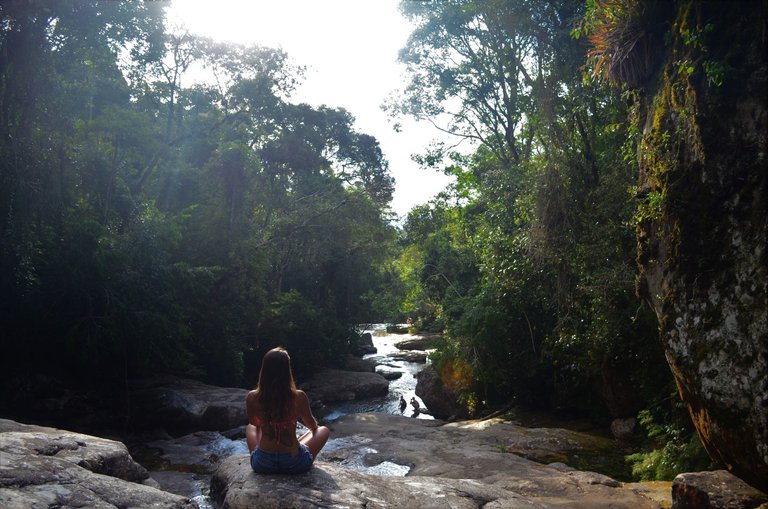
Que postagem SENSACIONAL!
Estou realmente admirado com seu conteúdo, e gostaria de deixar registrada minha felicidade em ter encontrado!
Particularmente gostaria de destacar que fui iniciado no mundo da compostagem, e desde então tenho utilizado meus ciclos para tentar produzir um pouco de vida no solo (terrível) onde moro.
Tenho conseguido algum resultado neste objetivo. Mas o que mais me chamou a atenção, e parece ser o foco da sua postagem, é a quantidade de lixo que deixei de produzir! Podemos falar em quilogramas por semana! É impressionante!
Aceite este !LUV
Se você gostou do conteúdo deste comentário, do elogio recebido, ou está se sentindo para baixo e precisa de um ombro amigo... gostaria de tornar o dia de alguém um pouco melhor? ou tem um post interessante que gostaria de compartilhar e você acha que merece elogios? por favor, junte-se à comunidade FreeCompliments. Recebemos a todos de braços abertos. :)
@crisciacm, @crazyphantombr(1/5) sent LUV. | connect | community | HiveWiki | NFT | <>< daily
! help(no space) to get help on Hive. InfoAhhhhh muito obrigada!! Fico feliz de verdade que tenha gostado do conteudo.
Exato, a gente deixa de produzir quiiiilos de lixo quando a gente faz coisas simples como essas. E de pouco em pouco a gente vai se adaptando e mudando.
Sobre compostar, eu moro em apartamento e pra mim a melhor solução foi contratar um serviço de compostagem urbana. Uma vez por mes a empresa passa na minha casa pra recolher o baldinho com os restos organicos pra compostar, e ainda ganho uma saco de adubo!
E só nisso eu já deixo de produzir alguns quilos de rejeitos por mês.
Compostagem eu acho beeem desafiador, não desiste!! hehe
Parabéns, seu post foi selecionado pelo projeto Brazilian Power, cuja meta é incentivar a criação de mais conteúdo de qualidade, conectando a comunidade brasileira e melhorando as recompensas, obrigado!
Ótimo post. Parabéns! 👏👏
Valeu Felipe!!
Congratulations @crisciacm! You have completed the following achievement on the Hive blockchain And have been rewarded with New badge(s)
Your next target is to reach 900 upvotes.
You can view your badges on your board and compare yourself to others in the Ranking
If you no longer want to receive notifications, reply to this comment with the word
STOPCheck out our last posts:
Your post was manually curated by @michupa.
Delegate your HP to the hive-br.voter account and earn Hive daily!
🔹 Follow our Curation Trail and don't miss voting! 🔹
🌎💚